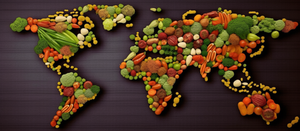The World of Vegan Cuisine: A Journey of Flavor
Jul 10, 2023
Veganism has sparked a gastronomic revolution, transforming traditional dishes from various cultures into imaginative plant-based alternatives. Vegan cookbooks have played a significant role, allowing people to explore the diverse flavors and cuisines of the world without sacrificing their commitment to a cruelty-free lifestyle.
Join us on a journey through vegan cuisine, highlighting five remarkable cookbooks showcasing the fusion of culture, tradition, and ethical eating. From Africa to China, Korea to Japan, and Mexico, these cookbooks exemplify the boundless possibilities and tantalizing flavors of vegan cooking.
African, Caribbean, and Southern American Vegan Food

In the realm of vegan cuisine, few cookbooks capture the essence of diverse cultural flavors as completely as Afro-Vegan: Farm-fresh African, Caribbean & Southern Flavors Remixed. Penned by the esteemed chef and food activist Bryant Terry, this popular book pays homage to the vibrant traditions of Africa, the Caribbean, and the American South. With a focus on farm-fresh ingredients and inventive plant-based remixes, Terry's cookbook helps readers celebrate the rich tapestry of food heritage in the African diaspora.
Within the pages of Afro-Vegan, you will discover recipes showcasing the beauty and complexity of Afro-centric flavors. From the Creole-inspired "Dirty Cauliflower Rice" to the soulful "Smoky Black-Eyed Pea Fritters," Terry offers a range of culturally rich and deeply satisfying dishes.
For instance, Terry presents a vibrant dandelion salad with a tantalizing pecan dressing and refreshing tangerines, showcasing his ability to combine unexpected ingredients and elevate simple dishes to new heights. The heirloom tomato salad with basil sea salt invites cooks to savor the natural sweetness and freshness of the tomatoes while experiencing a nuanced interplay of flavors.
Then there is a peanut stew with winter vegetables and cornmeal dumplings, where hearty flavors and comforting textures unite. Terry's chilled watermelon soup with quick-pickled cucumber and mint is a revelation, blending sweet and tangy notes with a hint of herbal freshness.
Not only does Afro-Vegan offer appealing recipes, but Terry goes beyond the kitchen, enriching the reader’s experience with suggestions of music and books to accompany the food.
Afro-Vegan is also a platform for Terry to advocate for food justice and social change. Throughout the cookbook, he emphasizes the importance of using local, seasonal ingredients, supporting sustainable farming practices, and promoting access to nutritious food within underserved communities. With his engaging storytelling, Terry invites readers to consider the broader implications of their food choices and encourages a more mindful approach to eating.
The book is handsomely illustrated with photographs capturing the vibrant colors and textures of the dishes, further enhancing the reader's epicurean experience. From the lush green vegetables to the mouthwatering spice blends, every image evokes a sense of the rich heritage of African, Caribbean, and Southern American culture underpinning the recipes.
Chinese Vegan Food

Next, meet Hannah Che, a Detroit native who challenges the notion that veganism and traditional Chinese cuisine are mutually exclusive. In her book The Vegan Chinese Kitchen: Recipes and Stories from a Thousand-Year-Old Tradition, Che presents her discoveries and creations, showcasing a diverse array of plant-based dishes that pay homage to China's rich food ancestry.
Motivated by a desire to bridge the gap between her vegan lifestyle and her family's love for traditional Chinese food, Che immersed herself in studying Chinese food history. Through her research, she uncovered a fascinating range of vegetarian and plant-based cooking traditions within Chinese cuisine. Her quest for knowledge even led her to attend the only vegetarian cooking school in China, expanding her understanding of the possibilities of vegan Chinese cuisine.
In The Vegan Chinese Kitchen, Che shares her culinary inquisitions, offering a wide range of traditional recipes sourced from various regions of China. Alongside these timeless classics, she presents her own creations as well as dishes inspired by China's flourishing vegan communities.
Recipes are thoughtfully organized into chapters based on their primary ingredients. From leafy greens, tofu skin, root vegetables, gluten, and rice and wheat noodles, Che covers an array of plant-based meal opportunities. For those new to Chinese cooking techniques, step-by-step photo sequences accompany certain recipes, ensuring readers can learn the required skills. However, many dishes rely on simple cutting and stir-frying methods, making them approachable for home cooks of all levels.
Cooks can discover an abundance of enticing recipes. The blanched sweet potato greens with crispy shallots showcase the freshness of the ingredients, while the pan-fried tofu skin cakes with pickled mustard greens and cilantro offer a harmonious blend of flavors. Scallion flower buns with Sichuan peppercorns introduce a delightful twist to a beloved classic, and the crispy fried mushrooms with five-spice salt provide a satisfying umami-rich experience.
To honor the cultural roots of these recipes, Che thoughtfully includes transliterations and Chinese characters for each dish, allowing readers to further connect with the essence of Chinese cuisine.
Korean Vegan Food

The third book on our list is The Korean Vegan Cookbook: Reflections and Recipes from Omma's Kitchen. Written by the creator of The Korean Vegan blog, Joanne Lee Molinaro, this book exposes readers to the traditions and possibilities of Korean cooking.
The heart of this cookbook is the connection between food, family, and identity. Molinaro skillfully weaves personal stories and reflections throughout the recipes, creating a narrative honoring the legacy of her omma (mother) and generations of Korean ancestors. With each recipe, readers get a glimpse into the cultural significance and emotional resonance of Korean food.
The Korean Vegan Cookbook presents an array of recipes that teach readers how Korean cooks think about composing meals and dishes. From the sizzling "Tteokbokki" (spicy rice cakes) to the comforting "Doenjang Jjigae" (fermented soybean stew), Molinaro guides cooks to capture the intricate balance of sweet, savory, spicy, and tangy that define Korean gastronomy.
Molinaro also ventures beyond conventional Korean recipes, offering a fresh perspective on plant-based alternatives to staple dishes, such as kimchis made without fish sauce. She similarly delves into vegan baking, introducing readers to milk bread made with plant milk, proving indulgent delights can be enjoyed while adhering to a plant-based lifestyle.
With confidence and enthusiasm, Molinaro shares an array of savory recipes highlighting the rich flavors of Korean cuisine, from the fieriness of spicy garlic tofu to the comforting warmth of bean sprout consommé ramen. She also includes the celebratory japchae, an irresistible combination of transparent sweet potato noodles tossed with spinach, bell peppers, and cabbage.
Molinaro also ventures into Korean-influenced dishes from other cuisines, adapting and infusing them with flair, such as a lasagna featuring a gochujang red sauce or seaweed sesame bagels. And for a sweet ending, Molinaro delights readers with a persimmon upside-down cake, a delightful twist on a classic dessert.
With her innovative adaptations and dedication to flavor, she demonstrates that a plant-based approach can elevate traditional dishes and introduce exciting new flavors to the vegan landscape.
Japanese Vegan Food

Embarking on a vegan or vegetarian journey may seem daunting when contemplating the intricate world of sushi, especially if one assumes that cucumber and avocado rolls are the only options available. However, Japanese food writer and esteemed cooking teacher Iina Sawabatake dispels this notion in her captivating and concise book, spanning 118 pages, Sushi Modoki: The Japanese Art and Craft of Vegan Sushi.
For those who crave the delicate flavors of Japanese cuisine, Sawabatake introduces the concept of "modoki," a Japanese term meaning mimicry. Through her inventive creations, she showcases the art of imitating fish and seafood-based sushi using plant-based ingredients. Each recipe is thoughtfully named after the sushi it aims to emulate, inviting readers to probe the possibilities of vegan sushi.
Sawabatake illustrates how to mimic the delicate texture and flavor of squid using Japanese yam cake or recreate the essence of abalone with oyster mushrooms. She unveils the secrets of imitating tuna through marinated bell pepper, crafting a remarkable plant-based alternative. The ingenuity continues as she reveals a method to replicate the taste of salmon using a combination of steamed and seared carrots and even introduces a substitute for sea urchin with kabocha squash.
The recipes are clear and precise, guiding readers through each step of the sushi-making process. With all-natural, whole ingredients at the forefront, Sawabatake emphasizes the importance of respecting and honoring the components that make up these vibrant and flavorful dishes. The book provides comprehensive guidance on five different styles of sushi, allowing readers to master the art of nigiri, maki rolls, chirashi bowls, inari, and oshi—each presenting a unique and elegant experience.
Within the pages of this useful resource, readers will find a collection of exceptional vegan sushi recipes that are a testament to the meticulousness of Japanese cooking practices. Sawabatake's thorough approach to sushi-making serves as an inspiration, showcasing the depth of her Japanese cuisine expertise and her reverence for vegan ingredients.
Mexican Vegan Food

Finally, Provecho: 100 Vegan Mexican Recipes to Celebrate Culture and Community by Edgar Castrejon is a vibrant celebration of Mexican cuisine reimagined through a vegan lens.
Castrejon approaches his recipes with instinct and originality, seeking to reinvent traditional Mexican dishes historically centered around meat. Through his clever adaptations, he breathes new life into these classic meals. Take, for instance, his posole rojo, where he replaces the customary pork with a variety of flavorful and moderately spicy dried chiles, resulting in a dish that satisfies both the palate and the conscience.
In his quest to recreate the tangy smoothness of Mexican crema, Castrejon innovatively employs homemade cashew milk, capturing the essence of this beloved Mexican staple. Even the batter coating his chiles rellenos undergoes an exciting transformation as he swaps traditional egg whites with aquafaba, demonstrating his resourcefulness in creating plant-based alternatives.
While Castrejon occasionally incorporates ingredients that may not be native to traditional Mexican cuisine (we're looking at you, tofu, and especially you, Himalayan pink salt), his approach remains grounded in accessibility and the spirit of Mexican home cooking. He takes into consideration ingredients that are readily available to home cooks in Mexico, ensuring his recipes can be enjoyed and replicated by anyone.
Provecho embodies versatility, presenting a wealth of enticing ideas and flavors that will captivate both seasoned cooks and kitchen novices alike. Castrejon's passion for vegan Mexican food shines through each page, inviting readers to embrace its richness while honoring their commitment to a vegan lifestyle.
The Vegan Journey Does Not End Here
The world of vegan cuisine is where creativity, innovation, and cultural appreciation intersect. The showcased cookbooks, Afro-Vegan, The Vegan Chinese Kitchen, The Korean Vegan Cookbook, Sushi Modoki, and Provecho have opened up new possibilities for plant-based cooking, demonstrating that flavor knows no boundaries.
Let us savor the mouthwatering plant-based creations inspired by these cookbooks, and let them inspire us to cultivate our own culinary prowess, infusing our kitchens with the vibrant spirit of global flavors. As we explore the world of vegan cuisine, we may discover that compassion and creativity are the essential ingredients that make every dish truly exceptional.
We have a variety of vegan and vegetarian cookbooks from around the world available online to inspire you. If you can’t see what you’re looking for on the website, contact us at letters@kitchenartsandletters.com, and one of our expert team will find the perfect book for you.


